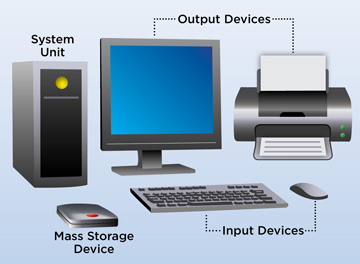
Advantages of Computer
Table of Content:
Today, the computer is used in every field and has made our day to day tasks very easy but there are some advantages and disadvantages of computers.
The computer has made a very vital impact on society. It has changed the way of life. The use of computer technology has affected every field of life. People are using computers to perform different tasks quickly and easily. The use of computers makes different task easier. It also saves time and effort and reduces the overall cost to complete a particular task.

Many organizations are using computers for keeping the records of their customers. Banks are using computers for maintaining accounts and managing financial transactions. The banks are also providing the facility of online banking. The customers can check their account balance from using the internet. They can also make a financial transaction online. The transactions are handled easily and quickly with computerized systems.
People are using computers for paying their bills, managing their home budgets or simply having some break and watching a movie, listening to songs or playing computer games. Online services like Skype or social media websites are used for communication and information sharing purposes.
The computer can be used as a great educational tool. Students can have access to all sort of information on the internet. Some great websites like Wikipedia, Khan’s Academy, Code Academy, Byte-Notes provides free resources for students & professionals.
Moreover, the computer is being used in every field of life such as medical, business, industry, airline and weather forecasting.
Following are certain advantages of computers
High Speed
-
The computer is a very fast device.
-
It is capable of performing the calculation of a very large amount of data.
-
The computer has units of speed in a microsecond, nanosecond, and even the picosecond.
-
It can perform millions of calculations in a few seconds as compared to the man who will spend many months to perform the same task.
Accuracy
-
In addition to being very fast, computers are very accurate.
-
The calculations are 100% error free.
-
Computers perform all jobs with 100% accuracy provided that the input is correct.
Storage Capability
-
Memory is a very important characteristic of computers.
-
A computer has much more storage capacity than human beings.
-
It can store a large amount of data.
-
It can store any type of data such as images, videos, text, audio, etc.
Diligence
-
Unlike human beings, a computer is free from monotony, tiredness, and lack of concentration.
-
It can work continuously without any error and boredom.
-
It can perform repetitive tasks with the same speed and accuracy.
Versatility
-
A computer is a very versatile machine.
-
A computer is very flexible in performing the jobs to be done.
-
This machine can be used to solve the problems related to various fields.
-
At one instance, it may be solving a complex scientific problem and the very next moment it may be playing a card game.
Reliability
-
A computer is a reliable machine.
-
Modern electronic components have long lives.
-
Computers are designed to make maintenance easy.
Automation
-
Computer is an automatic machine.
-
Automation is the ability to perform a given task automatically. Once the computer receives a program i.e., the program is stored in the computer memory, then the program and instruction can control the program execution without human interaction.
Reduction in Paper Work and Cost
-
The use of computers for data processing in an organization leads to the reduction in paperwork and results in speeding up the process.
-
As data in electronic files can be retrieved as and when required, the problem of maintenance of a large number of paper files gets reduced.
-
Though the initial investment for installing a computer is high, it substantially reduces the cost of each of its transaction.